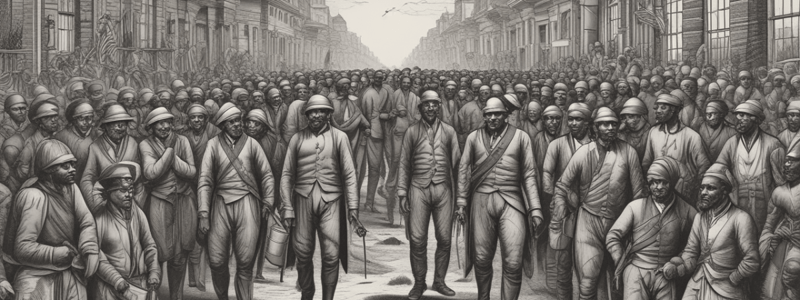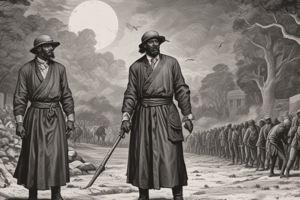Podcast
Questions and Answers
What is the primary goal of an abolitionist?
What is the primary goal of an abolitionist?
- To establish a new form of government
- To promote the expansion of slavery
- To reform the political system
- To eliminate a social practice, such as slavery (correct)
When did the significant abolitionist movement take place in American History?
When did the significant abolitionist movement take place in American History?
- 1890-1910
- 1870-1890
- 1850-1870
- 1829-1850 (correct)
What was the impact of the abolitionist movement on the US?
What was the impact of the abolitionist movement on the US?
- It led to the expansion of slavery
- It promoted the colonization of Africa
- It resulted in the Civil War and extended voting rights to Black male Americans (correct)
- It led to the establishment of a new form of government
What was the response of abolitionists to the practice of slavery?
What was the response of abolitionists to the practice of slavery?
When did the idea to eliminate slavery first emerge?
When did the idea to eliminate slavery first emerge?
What was the primary goal of David Walker's pamphlet in 1829?
What was the primary goal of David Walker's pamphlet in 1829?
What was the name of William Lloyd Garrison's abolitionist paper?
What was the name of William Lloyd Garrison's abolitionist paper?
What was Frederick Douglass's occupation before becoming an abolitionist?
What was Frederick Douglass's occupation before becoming an abolitionist?
What was the primary approach used by Henry Highland Garnet to end slavery?
What was the primary approach used by Henry Highland Garnet to end slavery?
What was the result of William Lloyd Garrison's work during the Civil War?
What was the result of William Lloyd Garrison's work during the Civil War?
What was the central theme of Harriet Beecher Stowe's novel, 'Uncle Tom's Cabin'?
What was the central theme of Harriet Beecher Stowe's novel, 'Uncle Tom's Cabin'?
What was Harriet Tubman's role in the fight against slavery?
What was Harriet Tubman's role in the fight against slavery?
What was the main message of Sojourner Truth's famous quote 'Ain't I a Woman'?
What was the main message of Sojourner Truth's famous quote 'Ain't I a Woman'?
What was the common argument made by abolitionists about humanity?
What was the common argument made by abolitionists about humanity?
What was the title of Frederick Douglass's famous speech in 1843?
What was the title of Frederick Douglass's famous speech in 1843?
Flashcards are hidden until you start studying
Study Notes
Abolitionists
- An abolitionist is an individual who advocates for the elimination of a practice, such as slavery or capital punishment.
- The most significant abolitionists in American history were active in North America from around 1829-1850.
Abolitionist Movement
- The abolitionist movement aimed to end slavery in America, following the abolition of slavery in Great Britain.
- Abolitionists believed that slavery was a weakness and a disgrace to the United States.
- They sent petitions to Congress, ran for political offices, and distributed literature to inform people in the South about the evils of slavery.
- The movement led to a political uprising, causing the Civil War, which ultimately extended voting rights to Black male Americans.
Notable Abolitionists
- David Walker: called for the abolition of slavery, denouncing it in a pamphlet in 1829, encouraging slaves to fight for their freedom.
- William Lloyd Garrison: founded the abolitionist newspaper "The Liberator" in 1830 and assisted in the formation of the New England Anti-Slavery Society.
- Frederick Douglass: a former slave who escaped to become a writer, speaker, and activist, advocating for the abolition of slavery in America.
- Henry Highland Garnet: an abolitionist who used a militant approach to end slavery, speaking against it in England and supporting the freedom of movement for Black people.
- Harriet Beecher Stowe: a writer who wrote a novel, "Uncle Tom's Cabin", highlighting the evils of slavery, which angered the South.
- Harriet Tubman: an abolitionist who escaped from slavery and assisted others to gain their freedom, also serving in the military and getting married while still enslaved.
- Sojourner Truth: an abolitionist who helped Black people escape slavery on the Underground Railroad, urging them to be hardworking and valuable to avoid exploitation.
Key Quotes
- David Walker: "Let no man of us budge one step, and let slaveholders come to beat us from our country. America is more our country than it is the whites-we have enriched it with our blood and tears."
- William Lloyd Garrison: "Be faithful, be vigilant, be untiring in your efforts to break every yoke, and let the oppressed go free."
- Frederick Douglass: "Fellow-citizens, pardon me, allow me to ask, why am I called upon to speak here today? What have I, or those I represent, to do with your national independence?"
- Henry Highland Garnet: "Let every slave throughout the land do this, and the days of slavery are numbered."
- Harriet Beecher Stowe: "The longest way must have its close - the gloomiest night will wear on to a morning."
- Harriet Tubman: "Slavery is the next thing to hell."
- Sojourner Truth: "Ain't I a Woman"
Studying That Suits You
Use AI to generate personalized quizzes and flashcards to suit your learning preferences.




